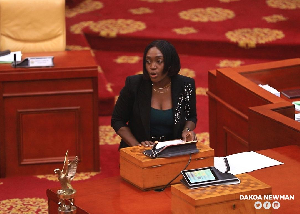The Minister of Gender, Children, and Social Protection, Dakoa Newman, has emphasized the collaborative efforts that brought forth the Affirmative Action (Gender Equity) Act, 2024, culminating in its passage by Parliament on July 30, 2024.
The minister clarified that while the President has not yet signed the Bill, the delay is due to final adjustments being made to ensure its precision and completeness before reaching his desk.
At the minister’s press briefing on the update on the Affirmative Action (Gender Equity) Act, 2024, on August 8, 2024, in Accra, Madam Dakoa Newman explained that the Bill has undergone substantial revisions since its inception, detailing the rigorous “winnowing” process that removed certain sections and refined the content.
According to her, despite these changes, the Affirmative Action Bill maintains its core mandate: a progressive increase in the minimum representation of women in leadership roles, starting at 30% in 2024 and reaching 50% by 2030.
She dismissed concerns about tokenism, asserting that “the women in Ghana are highly qualified and their inclusion in leadership is not merely symbolic but a recognition of their capabilities and contributions to society.”
Additionally, the Affirmative Action Bill is designed not to punish non-compliance but to incentivize organizations to embrace gender equity through potential tax benefits. She emphasized that this approach aims to encourage voluntary adherence to the law while demonstrating the broader societal benefits of empowering women in decision-making roles.
Madam Dakoa Newman reiterated that the Affirmative Action Bill’s ultimate goal is to empower capable Ghanaian women, providing them with the opportunities they deserve and marking a significant step toward achieving gender equality and parity in Ghana, according to UN standards.
General News of Friday, 9 August 2024
Source: gbcghanaonline.com













